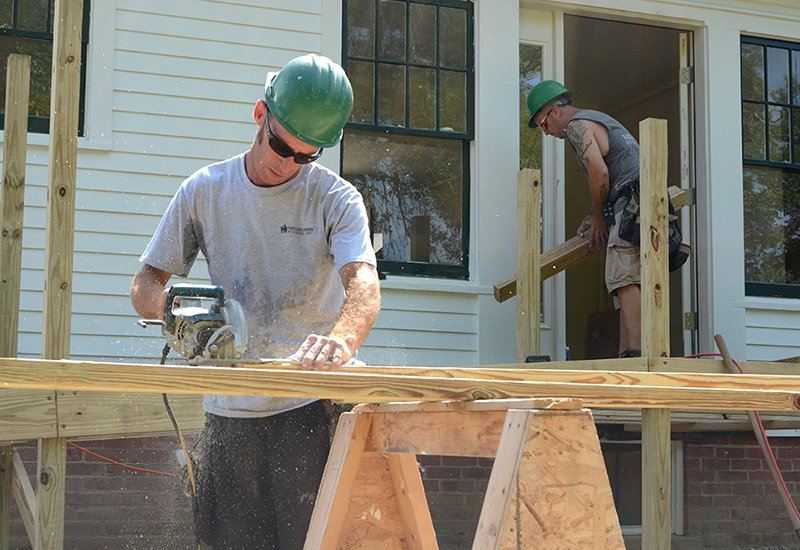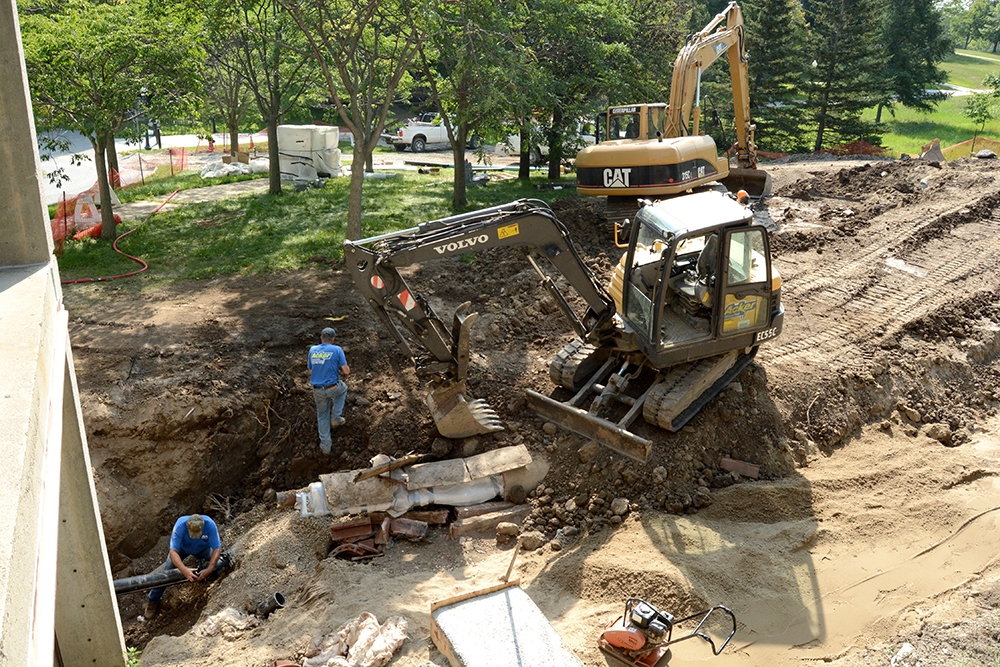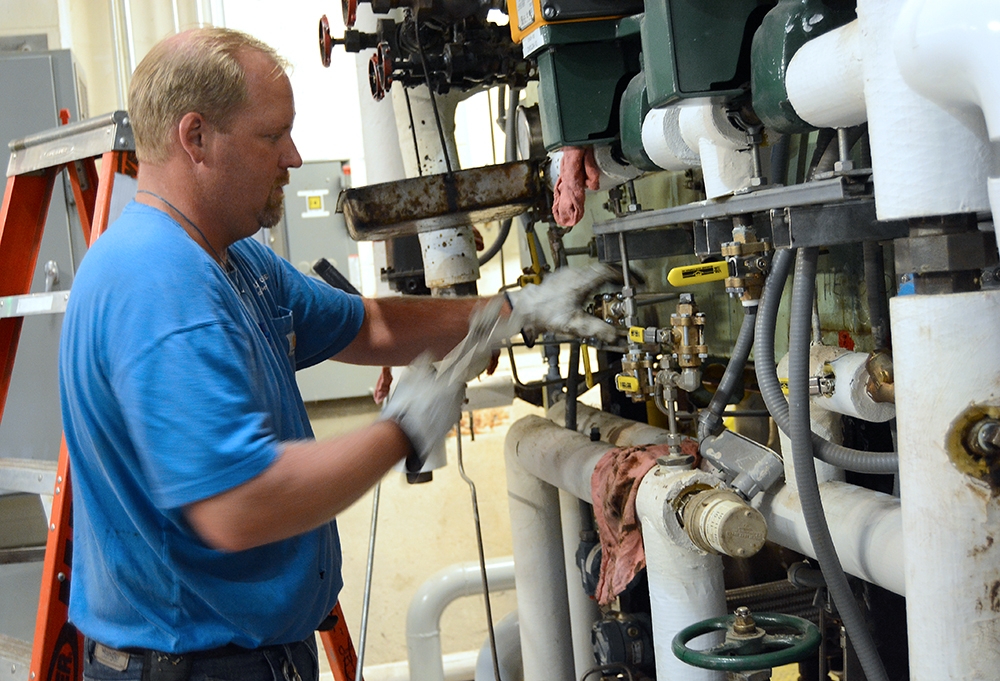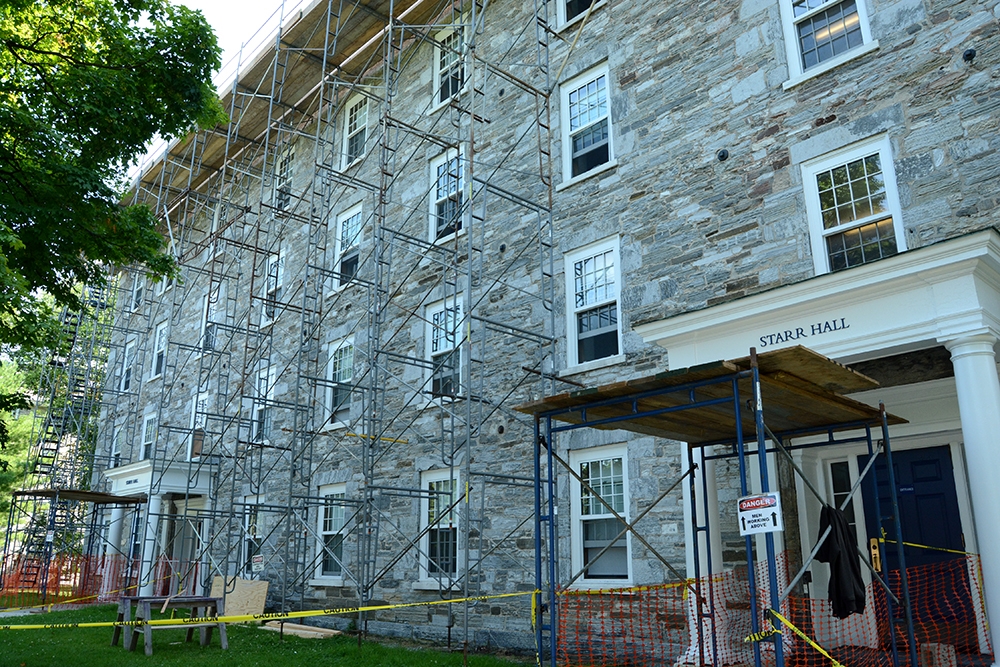Summer Construction Update

MIDDLEBURY, Vt. – Anyone walking across the Middlebury campus this summer is likely to see employees from Facilities Services and workers from Vermont contracting firms busy undertaking construction projects both large and small.
Every summer the institution tackles basic upgrades to its physical plant, from lighting improvements to painting projects to floor refinishing, and 2015 is surely no exception. But there are also a number of major construction jobs underway, and some are more visible than others.
Take the gaping hole about 20 feet wide and nearly 150 yards long on the north side of campus. Middlebury is replacing a section of the 50-year-old steam lines that run from the Service Building to Freeman International Center and back.
The pipes carry steam to the building for heat and domestic hot water, and then return the condensate back to the Service Building where it is turned into steam again and re-distributed throughout the campus’s 20,000 feet of underground steam lines.
“We had to replace this section because we have experienced three leaks in this leg over the past three winters,” said Luther Tenney, assistant director of Facilities Services, “and we certainly don’t want to leave old steam pipes insulated with asbestos in the ground.”

The steam pipe replacement project. (Click on photos to enlarge)
And despite the fact that Freeman International Center (FIC) is nearly 2,400 feet away from the Service Building, Middlebury’s steam heating system is highly efficient. “It’s all about preserving energy,” Tenny added. “We lose only about five percent of the heat [in moving pressurized steam] from one end of campus to the other.”
A less visible but no less important major project this summer has been the retrofitting of two gigantic boilers inside the Service Building. Originally oil-fired, the boilers were converted this summer to accept either oil or natural gas. And while the bulk of the campus’s heat and hot water is produced by Middlebury’s seven-year-old biomass plant burning locally sourced woodchips, the boilers are essential during the coldest spells of winter or when the biomass plant goes down for routine maintenance.
“The boiler retrofits and the necessary operator training and safety classes requires a lot more effort than most people would think,” offered Mike Moser, the Facilities Services director. “But using gas is much cleaner than burning No. 6 fuel oil, both in terms of the environment and the maintenance of our boilers.”
To accept natural gas, whether it originates from the ground or from another source such as biofuel, Middlebury also had to install a gas metering station on the east side of the Service Building to measure and control the temperature, flow, and pressure of the fuel going into its boilers.

Another major project in the works this summer is the preparation for building four new student residences on the west end of campus.
The site work and construction of three townhouse-style apartment buildings on Adirondack View (for 96 students) and a fourth suite-style building on nearby Ridgeline Road (for 62 more students) is expected to get underway this fall with a September 2016 completion date. The new housing will enable the College to remove the temporary modular structures (the “mods”) that house 35 students on the far western edge of campus and give Middlebury the ability to bring more undergraduates back on campus.
The student housing project will entail the demolition of the brick house at 82 Adirondack View and a slight shift in the centerline of Ridgeline Road. It will also require clearing the site of trees and chipping the hardwood for use in the biomass plant, and extensive earthwork needed to prepare for the foundations. The builder of the project for Middlebury will be Kirchhoff Campus Properties, a real estate development firm that has completed recent student-housing projects at Vassar College, Trinity College, and the Culinary Institute of America.
Kirchhoff will lease the land from Middlebury and retain ownership of the structures while the College will maintain the new buildings and grounds, pay the utilities, and provide the supervision for residential life. “KCP in essence will be invisible to the students,” said project manager Tom McGinn, “but since we are responsible for the buildings we want to make 100% certain that they are easily maintainable and energy efficient.”

The steam line replacement, the boiler retrofits, and the preparations for the new student housing are just a fraction of the jobs underway this summer.
Middlebury is renovating Carr Hall to convert it into an Intercultural Resource Center and replacing the skylights on the fourth floor of its second oldest dormitory, Starr Hall, which was built in 1861. The building at 70 Hillcrest Road (the Queer Studies House) is undergoing a top-to-bottom renovation, while two of its neighboring garages are also getting much-needed repairs.
Among this year’s 200 warm-weather projects are window replacements, painting and carpentry tasks, plumbing and heating jobs, landscaping improvements, roofing repairs, and the replacement of exterior steps and railings.
The 2015 list of summer projects – from Alumni Stadium (resealing and recaulking joints in the concrete) to Voter Hall (renovate basement for use as office space) – is extensive because the months of June, July, and August are Facilities Services’ best opportunity to maintain and improve Middlebury’s infrastructure.
– With reporting and photography by Robert Keren

